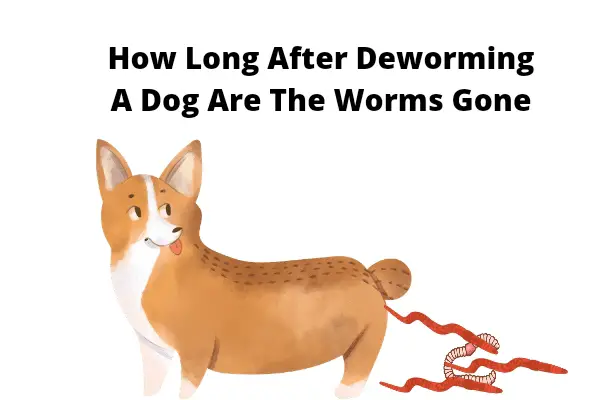How Long After Deworming A Dog Are The Worms Gone (Answered)

Dealing with worms is one of the most common issues dog owners have, so let’s take a look at how long after deworming a dog are the worms gone completely from the dog system.
Worm eggs can be passed from pet to pet by excrement, contaminated food, or infected surfaces.
It’s critical to keep your dog away from other animals’ waste. This is the most straightforward way for your dog to become sick from worms.
How Long After Deworming A Dog Are The Worms Gone
If a dog is not reinfected with worms by grooming itself or eating worm-infected feces after deworming, it will take 3 to 6 days for the worms to be completely gone out of the dog’s intestines or system, and no more worm treatment will be necessary.
Worms are one of the numerous health conditions that may afflict a dog, and they are possibly the most prevalent.
Diarrhea, vomiting, and licking behind the tail are just a few of the bad side effects that these worms can induce.
They can develop into more serious health problems if not addressed, especially in the intestines.
It should come as no surprise that worms and other parasites make their way into your dog due to its eagerness to lick everything in its path.
Worms are transferred when your puppy sniffs another dog’s excrement or dirt that has been polluted.
How long does it take a worm to die after deworming a dog
Worms in dogs normally begin to die off 5 to 10 hours after they have taken and digested their worm medication; nevertheless, a dog might continue to excrete worms for several days after taking treatment.
Factors affecting how long it takes a worm to go out of a dog system
The amount of days it takes for worms to be entirely removed from a dog’s system is also determined by the following factors:
- Individual worm kinds found in the dog’s system.
- The sort of therapy or medicine given to the dog.
- The number of individual worms found in the intestines of dogs.
- Rebound impact after deworming.
- The worm’s resistance to the antibiotic currently being used.
- Hygiene procedures in the dog habitat, for example.
Symptoms of worms in dogs
Worms in your dog can be a serious disease that requires prompt attention, therefore knowing the indications of worm infestation is crucial.
The following are some of the most prevalent worm symptoms in dogs:
- Continuous and persistent diarrhea in dogs.
- Changes in the dog’s coat or hair that are visible
- Presence of swollen or distended belly in dogs.
- Presence of mucus or blood in dog’s feces.
- The presence of worms in the vomit of dogs.
- Sudden change in dog’s feeding habits.
- Sudden and continuous weight loss in dogs.
- Presence of worms in dogs feces.
- The presence of worms in the buttocks of dogs.
- Presence of pale gums in some dogs.
Types of worms found in dogs
Here are the most common types of worms found in dogs:
Roundworms
Roundworms in dogs may grow to be 3-5 inches long and resemble a piece of wet spaghetti when they reach adulthood.
Roundworms can be spread from dog to dog by lactating, eating contaminated meat, or coming into touch with infected feces.
Roundworm eggs can be discovered in the soil, on plants, in sick animals’ excrement, and on the bodies of deceased animals.
They’re spherical, white, and smooth. Some have compared them to living noodles, and they may infect a dog.
Tapeworms
Tapeworms can be transmitted to dogs by infected fleas. By biting on an irritated region, your dog may accidentally consume a flea.
The flea eggs will hatch if they are eaten. After latching onto the intestines, the worm can grow to reach up to 8 inches long.
Tapeworms are different from other worms in that they grow in segments. These particles might get loose and end up in your dog’s feces.
They’re rectangular and flat. Your dog’s anus might get clogged with eggs, causing it to slide about on the floor.
Hookworms
Hookworms are tiny parasites that can cause serious health problems for your dog.
These parasites stick to the small intestine of your puppy and take blood and nutrients from the body.
Anemia, weakness, and a loss of appetite are all symptoms of hookworms.
Hookworm infestation can be lethal in extreme situations, thus treatment should begin as soon as possible.
Heartworms
Heartworms live in the arteries of the heart and lungs in dogs.
The illness is conveyed by infected mosquitoes, and it travels throughout the body for around 6 months before settling in the circulatory system.
Heartworms are only transmitted across species through the bite of an infected mosquito.
They are preventable and treatable, but they can be fatal if not diagnosed and treated before the infection advances.
Whipworms
Whipworms are microscopic parasitic worms that look like threads. The big intestines are usually infected.
Malnutrition and anemia are some of the signs of whipworms in puppies. You may also detect blood in your dog’s stool.
Whipworms can only be identified under a microscope, therefore your veterinarian will require stool samples to identify them.
Whipworms may be lethal if left untreated, therefore it’s critical to get them treated as soon as possible.
How do dogs get worms
The following are some of the most prevalent ways dogs can get worms you should know:
- Worms are transmitted to dogs by the consumption of worm-infested food.
- Worms are passed down to dogs from their mothers.
- Drinking worm-infested water gives dogs worms.
- Worms are transmitted to dogs by the consumption of worm larvae or eggs.
- Worms are spread by dogs cleaning or licking themselves.
- Infected mosquito bites give dogs worms.
- Dogs contract worms after consuming worm-infested uncooked meat.
- Worms are transmitted to dogs by ingesting worm-infested excrement.
- Worms are spread by dogs in unkempt gardens around the house.
- Worms are transmitted to dogs by other animals.
How worming medication works in dogs
Most worm medications or therapies can kill adult worms within 5 to 10 hours of delivering them to dogs. However, it may take days for the dog to poop out the worms.
In certain rare cases, a second dose given 20 to 29 days later is needed to destroy any surviving larvae at the time of treatment.
Antiparasitic worm treatments or pharmaceuticals destroy any worm eggs or larvae in the body and expel them with the feces.
Wormers, unlike vaccination, are only efficient in killing live worms and do not prevent re-infection.
As a result, dog deworming should be done at least three times each year.
In general, after receiving a deworming dosage, a dog’s chances of catching worms again are high.
Find out what it means to still see a live worm in your dog poop after deworming.
How to diagnose worms in dogs
Your veterinarian will do a thorough check of your dog and ask you for a complete medical history.
The majority of healthy animals will show no signs of worm infestation. Puppies with a high worm load may have roundworms.
They may develop a pot belly as a result of a large number of worms in extreme situations.
The most common method for finding worms is microscopic stool inspection; however, a single fecal test might be deceptive since eggs are not always expelled into the feces.
Broad-spectrum dewormers are routinely used in situations where intestinal worms are suspected, and deworming cats who go outside and hunt on a regular basis are also suggested.
Do dogs poop out worms after being dewormed
Yes, dogs poop up worms after being dewormed because the deworming drug causes the dead worms in the dog’s intestines or systems to flow into the stool.
Do dogs feel ill after deworming
Yes, according to the intensity of the worm infestation, dogs can become unwell after deworming, this means some dogs may have a slight reaction to a deworming treatment, such as vomiting or diarrhea, this is unusual.
Giving the dogs oral deworming pills with meals is sometimes recommended to reduce gastrointestinal pain.
How to tell your dog still has worms after deworming
Here are some symptoms that your dog still has worms after being dewormed:
- Dog still pass out living worms 3 to 7 days after deworming medication.
- Weight loss that was unexpectedly obvious only a few days after deworming.
- Coughing that was unnecessarily extreme a few days after deworming.
- Even after deworming medicine is finished, the coat remains drab.
- Shortly after deworming, respiratory difficulties persist.
- Shortly after deworming, the distended abdomen reappears.
- Shortly after deworming, diarrhea persists.
- Even when the worm treatments are finished, your dog still have poor appetite.
- After the deworming dog days are completed, there is a sudden collapse.
- After deworming, the vomiting continues.
- Dehydration that occurred unexpectedly a few days after deworming.
- Even days after deworming, lethargy persists.
How to stop a dog from getting reinfected with worms after deworming
Following are some suggestions for preventing worm reinfection after your dog has been dewormed:
- Always follow the veterinarian’s directions when giving your dog worm treatment.
- Other pets should not be let around your dog while it is being dewormed or thereafter.
- Make sure you have an effective flea control spray or system in place before deworming.
- On a regular basis, clean up your dog’s excrement and sterilize the waste spot.
- Avoid over-grooming your dog when deworming.
- To minimize cross contamination, keep an eye on your dog’s weight and excrement at all times.
- Keep your dog in a separate room or in a limited area.
How to prevent worm infestation in dogs
Here are some general guidelines for worm prevention in dogs:
- Keeping your dog from eating the damp, green grass outside your front door first thing in the morning is a good idea.
- Dogs should be given deworming pills on a regular basis.
- You must groom your dog thoroughly and on a regular basis to get rid of fleas.
- Maintain a safe distance between your dog and any suspected pets.
- Maintain a safe distance between your dog’s water bowl and the windows and doors.
- Allowing your dog to drink from a watering can that has been full of water for more than two days is not a smart idea.
- Inspect your dog’s food to see whether he’s consumed any infected raw meat.
- As soon as possible, scoop any excrement on your property, including that of dogs and other animals.
- Walking your dog through areas where other dogs and cats have dumped their waste is not a smart idea.
- To limit mosquito populations, avoid allowing mosquitos to nest in standing water.
More posts on dogs and worms:
- Dead Worms In Dog Poop: 6 Simple Reasons.
- Can Dogs Get Worms From Cats: 12 Ways Cats Can Infect Dogs.
- Can Humans Get Worms From Dogs: 7 Ways You Can Get Worms.
- Where Do Dogs Get Worms From: 10 Places Dogs Get Worms.
- How Dogs Get Heartworm: A Complete Insight & Facts.
- Worms in Dogs.
- Roundworms in Dogs.
With all the above information provided on this page, I strongly hope your question about how long after deworming a dog are the worms gone completely was answered!




![How to Know if Your Dog is Deaf [12 Signs & Tips] How to Know if Your Dog is Deaf](https://petcreeks.com/wp-content/uploads/2023/09/medicine-5003631_640-1.jpg)

